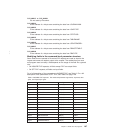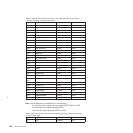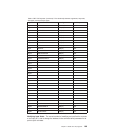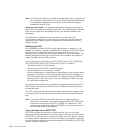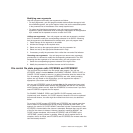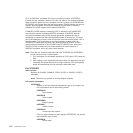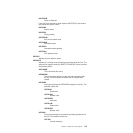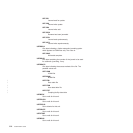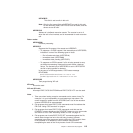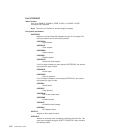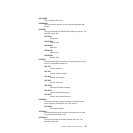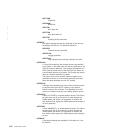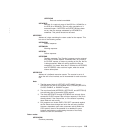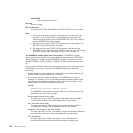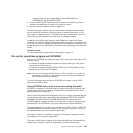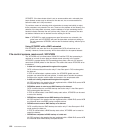UEFACBCP
This field is set to nulls in this exit.
Note: Only the first seven fields of UEPFINFO are set for this exit.
Of the remaining fields, URFFRCLG is set to blanks, and the
others are set to nulls.
UEPRECUR
Address of a halfword recursion counter. The counter is set to 0
when the exit is first invoked, and is incremented for each recursive
call.
Return codes
UERCNORM
Continue processing.
UERCBYP
Suppress the file request. You cannot use UERCBYP:
v To suppress a CLOSE request if the second byte of UEPFSREQ
indicates it is one of the following types of close:
– End of load-mode close (UEPFSELM)
– Immediate close (UEPFSIMM)
– Immediate close pending (UEPFSICP)
v To suppress an OPEN request if a file is being opened to carry
out backout processing, because this would cause a backout
failure. The second byte of UEPFSREQ is set to UEPFSOFB if
the file is being opened for backout.
In the case of a valid suppression, CICS issues message
DFHFC0996:
Open/Close/Enable/Disable/Cancel of close of file
filename suppressed due to intervention of user exit
UERCPURG
Task purged during XPI call.
XPI calls
All can be used.
API and SPI calls
All except EXEC CICS SHUTDOWN and EXEC CICS XCTL can be used.
Note:
1. Take care when issuing recursive commands not to cause a loop. For
example, it is your responsibility to avoid entering a loop when a file
control request is issued from the XFCSREQ exit. Use of the recursion
counter UEPRECUR is recommended.
2. Exit programs that issue EXEC CICS commands must first address the
EIB. See “Using CICS services” on page 4.
3. Exit programs that issue EXEC CICS commands, and that use the
DFHEIENT macro, should use the DFHEIRET macro to set a return code
and return to CICS. See “Returning values to CICS” on page 10.
4. Exit programs can invoke EXEC CICS SET commands against the file
whose state change has led to the exit being invoked. However,
dependent upon other concurrent activity within the CICS system, there
is the potential for a deadlock to occur between tasks that are
manipulating the state of the file by means of such SPI commands.
Chapter 1. Global user exit programs 115



